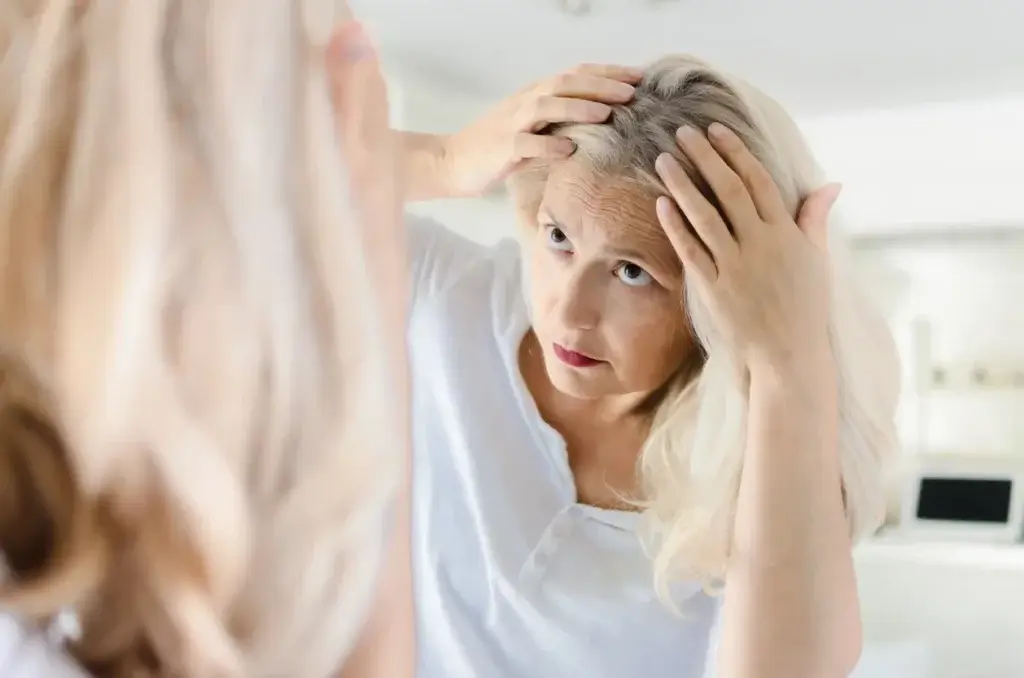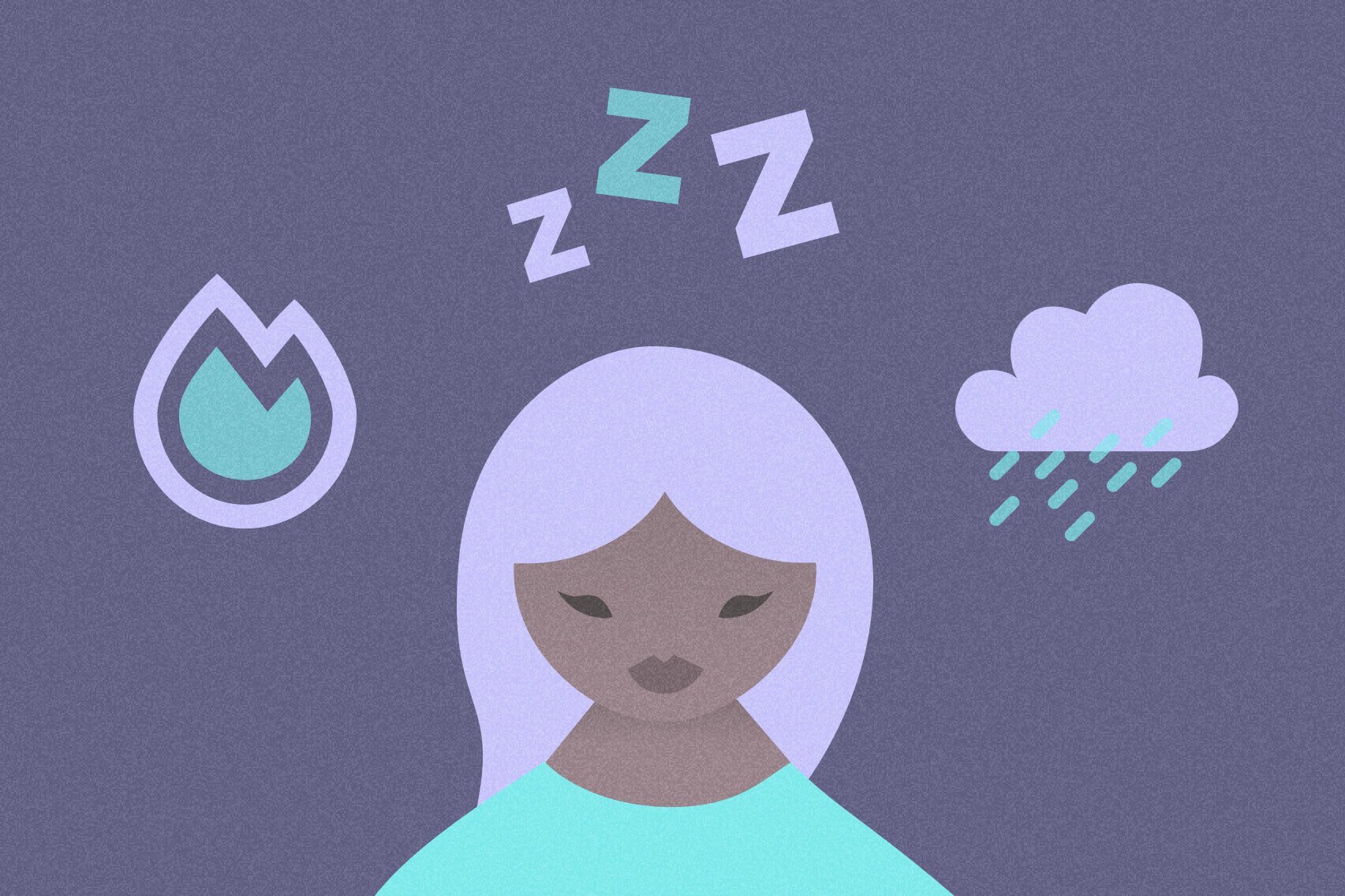6 mins read
Menopause & Hair Loss: What’s the Connection?

- What Causes Hair Loss After Menopause?
- Androgen Predominance
- Diminished Hair Growth Cycle
- Increased Shedding
- Stress
- Thyroid disorders
- Nutrition
- Individual Susceptibility
It’s not uncommon for women to experience excess hair loss after menopause, but what causes it and how can you prevent it?
What Causes Hair Loss After Menopause?
The exact cause of your hair loss can be difficult to pinpoint, but there are several triggers that could be the cause:
Oestrogen Decline
Oestrogen is a key hormone that maintains the health of hair follicles and regulates the hair growth cycle.
When oestrogen levels drop during perimenopause and menopause, hair follicles become more susceptible to ‘miniaturisation’, a process where they shrink and produce thinner, weaker hair.
Androgen Predominance
While oestrogen promotes hair growth, androgens, including testosterone, have the opposite effect.
During menopause, the decrease in oestrogen allows androgens to have a more significant impact on hair follicles, particularly in the scalp. This increased androgen activity can lead to a further miniaturisation of hair follicles, accelerating hair loss.
Diminished Hair Growth Cycle
Oestrogen also plays a role in maintaining the normal hair growth cycle, which involves three phases: the anagen phase (active growth), catagen phase (transitional), and telogen phase (resting).
With lower oestrogen levels, the anagen phase becomes shorter, reducing the average time for hair to grow to its full length.
Increased Shedding
As hair follicles miniaturise, they produce finer and shorter hairs, which are more prone to shedding. This increased shedding contributes to the visual thinning of hair that many women experience during menopause.
Stress
The transition through perimenopause to menopause can cause a lot of stress as you experience new physical and physiological changes.
Stress can induce hair loss in a few ways, including:
- Telogen Effluvium: Stress can trigger a type of hair loss called telogen effluvium, which occurs when a large number of hair follicles prematurely enter the telogen, or resting, phase of the hair growth cycle. This sudden surge in telogen hair can lead to increased shedding, especially when brushing your hair.
- Diminished Blood Flow: Stress can constrict blood vessels, reducing blood flow to the scalp and hair follicles. This restricted blood flow can hinder the delivery of essential nutrients and oxygen, which are crucial for healthy hair growth.
- Increased Cortisol Production: Stress triggers the release of cortisol, a hormone that can have a negative impact on hair growth. Cortisol can suppress the activity of androgen receptors in hair follicles, leading to miniaturisation and hair loss.
- Immune System Alterations: Stress can alter the function of the immune system, potentially causing it to attack hair follicles as foreign invaders. This autoimmune response can further damage hair follicles and contribute to hair loss.
- Impaired Nutrient Absorption: When stressed, the body prioritises essential functions, such as digestion and respiration, over nutrient absorption. This can lead to a deficiency in nutrients that are important for hair growth, such as iron, zinc, and vitamin B.
Thyroid disorders
Both hypothyroidism and hyperthyroidism can cause hair loss. In hypothyroidism, the reduced production of thyroid hormones slows down the hair growth cycle, whereas hyperthyroidism speeds up the growth phase. This causes hair to grow faster but also to be thinner and weaker.
Nutrition
Poor nutrition can have a significant impact on hair health, leading to hair loss. A balanced diet provides the essential nutrients required for healthy hair growth and maintenance. When the body lacks these nutrients, hair follicles may not receive the necessary support, resulting in various hair problems.
Iron, zinc and vitamin D are all important nutrients for hair health. A study we carried out in 2024 revealed 61% of UK adults have low vitamin D levels.
Individual Susceptibility
While the decline in oestrogen levels, thyroid disorders and nutrient deficiencies are all common triggers for hair loss, the degree and rate of hair loss can vary among women. This variability is likely influenced by genetics, lifestyle factors, and other hormonal changes.
“Menopause heralds a sea change in a woman’s physiology, and not only the obvious ones relating to the menstrual cycle. Hair loss is a common complaint in as many of 10% of women. The primary culprit is the decline in oestrogen levels as it’s important for the hair growth cycle by extending the duration of the anagen (growth) phase and delaying the telogen (resting) phase. Other factors, such as thyroid changes, nutrition, genetic predisposition and lifestyle choices, can exacerbate the problem. Understanding the multifaceted causes of menopausal hair loss is essential for developing personalised management strategies.”
Dr Thom Phillips
Finding the Cause
With so many causes of hair loss, finding the cause might seem like an impossible task, but testing your blood can help. A home blood test can track hormones related to hair loss, such as oestrogen, LH, FSH and testosterone. Knowing how these hormones are fluctuating in your blood can help reveal the cause, and give you the tools you need to find a treatment, whether that’s hormone replacement therapy (HRT) or hair loss treatment.
Our menopause health test is designed to help you keep track of your health after menopause – including muscle and bone health, heart health and hormones that could be affecting your mood, sleep and energy
“Hair loss, irrespective of menopausal status, is often something people really worry about. Some simple blood tests can really quickly identify a possible cause and sometimes some really easy fixes!”
Dr Thom Phillips
How to Prevent Hair Loss After Menopause
- Manage stress. Stress can play a role in hair loss, so finding healthy ways to manage stress can help to prevent or reduce hair shedding. Some relaxation techniques that may be helpful include yoga, meditation, and deep breathing exercises.
- Hormone Replacement Therapy. Among other benefits, HRT can help balance out oestrogen levels to support hair growth and health. You should speak to your GP about hormone replacement therapy if you’re concerned about hair loss.
- Get enough sleep. When you don’t sleep enough, your body produces more of the stress hormone cortisol, which can also contribute to hair loss. Aim for 7-8 hours of sleep per night to give your body the rest it needs to function properly.
- Eat a healthy diet. A diet rich in fruits, vegetables, and whole grains can help to provide your body with the nutrients it needs for healthy hair growth. Be sure to include plenty of iron-rich foods, such as lean meats, poultry, fish, and beans, as well as zinc-rich foods, such as nuts, seeds, and legumes.
- Exercise regularly. Exercise helps to improve blood circulation to your scalp, which can help to nourish your hair follicles and promote healthy hair growth. Aim for at least 30 minutes of moderate-intensity exercise most days of the week.
- Avoid excessive heat styling. Heat styling tools, such as blow dryers, curling irons, and straighteners, can damage your hair and make it more prone to breakage. When using these tools, be sure to use a heat protectant spray and limit your styling time.
- Use a gentle shampoo and conditioner. Harsh shampoos and conditioners can strip your hair of its natural oils, making it more fragile. Choose gentle, sulphate-free shampoos and conditioners that are specifically formulated for thinning hair.
You should also avoid smoking, as it can damage hair follicles and make them more prone to breakage. Smoking can also increase oestrogen declines, leading to further hair loss and reduced hair health.
- Health scores calculated
Close
This information has been medically reviewed by Dr Thom Phillips
Thom works in NHS general practice and has a decade of experience working in both male and female elite sport. He has a background in exercise physiology and has published research into fatigue biomarkers.

Dr Thom Phillips
Head of Clinical Services
Related articles
Like this article? Here are some more based on similar topics.






